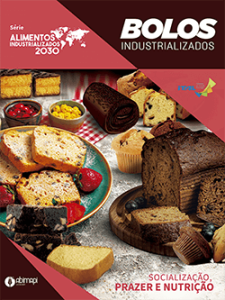NUTRITIONAL VALUE OF INDUSTRIALIZED CAKES
Cakes are typically a central food on celebrations and hospitality a home, associating the pleasure provided by the great diversity of delicious recipes, with its nutritional value formed by the composition that, in addition to flour, fat, and sugar, it usually includes eggs, milk, cocoa, fruits, nuts, seeds, among other very nutritive foods. Due to its wide variety of recipes, cakes can present well-distinct quantities of calories and nutrients, these differences are observed by the sample of products analyzed in the study conduced by Ital.
In the sample of 210 products, based on the nutritional label, the quantities of nutrients of mandatory statement were tabulated (proteins, dietary fiber, calories/energy value, carbohydrates, saturated fat, trans fat and sodium) and voluntary statement (sugar, vitamins and minerals).
PROTEINS
Industrialized cakes contribute with significant quantities of PROTEINS for the consumers feeding and nutrition. Even though there is a great variation in quantities of proteins present in the different products, there are cakes that can be considered as a SOURCE and also have a HIGH CONTENT of proteins.
DIETARY FIBERS
Many cakes contribute with significant quantities of DIETARY FIBERS for the consumers feeding and nutrition.
VITAMINS and MINERALS
A small quantity of cakes have a voluntary statement of VITAMINS and MINERALS in the nutritional label. Among them, there are cakes with high content of Calcium, Iron, Zinc, and Vitamins A, B1, B2, B3, B5 and B6, per portion of 60 g.
CALORIES (ENERGY VALUE)
Generally, cakes are not products with low ENERGY VALUE as they are compound of wheat, sugar, oils and fat. However, the quantities of calories vary significantly among the analyzed products..
CARBOHYDRATES
Generally, cakes, industrialized or not, usually contain CARBOHYDRATES due to ingredients to which they are prepared, mainly flours and sugars. However, according to the type, quantities vary significantly among the products.
SUGAR
Generally, cakes, industrialized or not, usually contain SUGAR in its preparation. However, there are products with reduction in the content of sugar and also the “sugar-free” recipes.
SATURATED FATS
Generally, the quantities of saturated fats in cakes vary a lot among the different types of products, there are products containing from 0.0 g to 8.6 g.
TRANS FATS
The quantities of TRANS FAT in cakes vary a lot according to the ingredients present in their formulation. Most part of the analyzed products had a statement of trans fat-free.
SODIUM
The quantity of SODIUM in cakes varies significantly according to the formulation, and there are several products with low sodium content.




